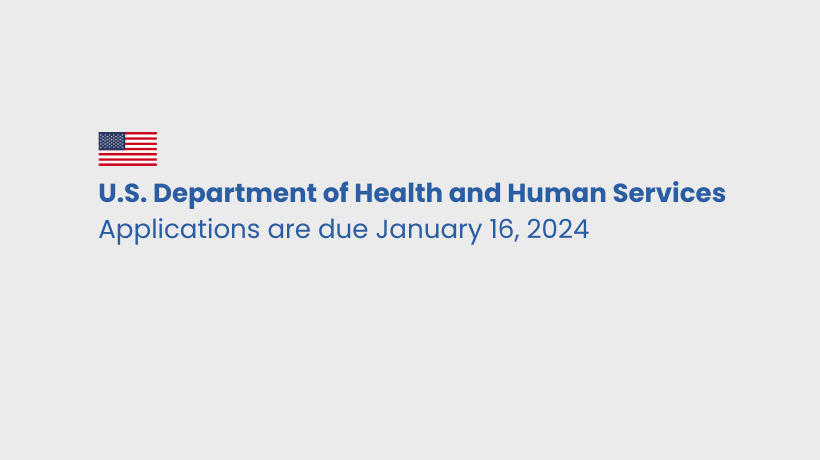U.S. Department of Health and Human Services Advisory Committee on Long COVID is Seeking Applicants

FACA FAQs
Read Before Applying
- How many members will be on the committee? The Secretary’s Advisory Committee on Long COVID (Committee) will include up to twenty members.
- Who will be committee members? Voting committee members will be designated as special government employees (SGEs). SGEs will include individuals with the following areas of expertise:
- Lived experience with Long COVID or as a caregiver to someone with Long COVID
- Providing services, including medical care, behavioral health care, and social services, for people with Long COVID
- Disability and chronic illness and the relationship with Long COVID
- Addressing the impacts of Long COVID at a population level (public health)
- Long COVID in the workplace, including discrimination and civil rights
- Scientific and social research on Long COVID and associated conditions and their impacts
- Reducing health disparities and addressing underserved communities
- Membership may also include non-voting representatives from:
- The Long COVID research and development (R&D) industry
- Non-voting Federal Liaisons
- What is the scope of the committee? The committee’s role is to advise the Secretary of Health and Human Services on Long COVID and associated conditions, with a focus on health equity.
- Who should apply? We encourage anyone who believes they fall into one of the above categories and who has an interest in serving on the committee to apply.
- When are applications due? The applications will be due January 16th.
- What is required in an application? The application should include the following items:
- A cover letter, which includes the name and workplace of the person being nominated, the reason for the nomination, and a statement of willingness to serve
- The name, address, telephone number, and email address of the individual being nominated (and nominator, if applicable)
- A copy of the nominee’s resume or curriculum vitae (CV). The CV should include
- Education
- Current and former experience
- Affiliations
- Current memberships on expert panels, committees, and other relevant groups—including positions held
- Peer-reviewed publications in the past five years
- Oral presentations in the past five years
- Editorials, opinion pieces, and blog posts in the past five years
- Grants, contracts, or research funding for the past fifteen years
- The name of any corporation, professional society, association, panel, company, firm, government agency (at any level), research organization, educational institution, committee, or other organization or institution in which the nominee’s services have been, will be, or are expected to be provided with or without compensation, including on a part-time or seasonal basis as an officer, medical staff, board member, owner, trustee, director, expert advisor, consultant (paid or unpaid), unofficial spokesperson, member of speakers bureau, or expert witness (for past 5 years and upcoming)
- Other paid travel or honoraria received not included above for the past five years.
- If the nominee does not have a current professional history, a letter of recommendation may be used instead.
- How long does the application process take? On average, we anticipate it will take up to an hour to assemble the cover letter and background materials and about ten minutes to upload them.
- Will accommodations be made for people with disabilities? We encourage participation from people with lived experience and will make reasonable accommodations for those with disabilities.
- What is the difference between a resume and a CV? A CV presents a full history of your academic credentials. By contrast, a resume is a concise snapshot of your skills and qualifications.
- Will there be a formal interview? There is no formal interview involved.
- How will I know if I am selected? How will I know if I am not? We will reach out to all those who are selected to provide them with an opportunity to confirm they are still interested in serving as special government employees (SGEs) or industry representatives. After the committee is appointed, we will also notify those who haven’t been selected.
- How are my personal finances taken into consideration? Will I be disqualified if I have debt?Personal finances will be taken into consideration as part of the conflict-of-interest review process. Interested applicants may review a sample financial disclosure form from the Office of Government Ethics. Consumer debt (e.g., credit card debt, student loans, mortgage) will not be taken into consideration as part of the advisory committee selection process.
- If I am selected…Will I be paid for my time? How much? Is it considered income I have to pay taxes on? Only SGEs will be paid for their time. SGEs will receive a form 1099 and the tax implications will depend on each SGE’s individual circumstances.
- Will I need to travel to DC? Will I be reimbursed for travel, lodging and per diem? There may be occasional travel to Washington, DC. If so, that travel will be reimbursed at the Federal Per Diem Rate. More information about Federal travel will be covered during the onboarding process.
- What is the time commitment? How long will an appointment last? We anticipate that Committee members will put in about 20-30 hours a month for their service. The appointment is for a year but may be renewed as needed.
- What is the “vetting” process like? The Office of Long COVID Research and Practice will recommend committee members to the HHS Secretary, who will review the recommendations and make the final decision. Potential members will undergo a background check to ensure they do not have a conflict of interest that would prohibit them from serving on the Committee. Each Committee member will submit an initial confidential financial disclosure report and will continue to submit one annually until the Committee concludes.
- Will participation on this Committee impact my other work? How do I avoid a conflict of interest? The Office of Long COVID and HHS ethics will ensure Committee members appointed as Special Government Employees comply with conflict-of-interest statutes and other applicable Federal ethics rules. If any committee member has any questions during their service, they should reach out to HHS or their contact in the Office of Long COVID. More information about conflicts of interest can be found here. Representative members are not subject to ethics review and have inherent conflicts because they represent the interests of their group or industry.
- What is the difference between a Special Government Employee and a Representative? A Special Government Employee (SGE) is a government employee who works 130 days or less per 365-day period and does not have conflicts of interest. SGEs are chosen because of their expertise and lived experience as discussed in “Who will be committee members?” above. SGE members on this committee are voting members. A representative member is an individual who represents the viewpoint of the industry/group as discussed in the in “Who will be committee members?” question above. A representative member may not have expertise in this area, but they have been chosen because the industry/group believe this person is able to represent their interests on this Committee. Representative members are not government employees, not subject to the Federal ethics rules, and are non-voting members of the Committee.
- Where can I learn more about FACAs and being an SGE? The OGE Institute for Ethics and Government has developed 13-minute video that provides an overview of SGEs and FACAs as well as some non-FACA work. You can view it here. For more information about conflicts check out the Office of General Council report on Ethics Rules for Advisory Committee Members and Other Individuals Appointed as Special Government Employees
- If I am selected what does the onboarding process look like? Onboarding will include all training necessary to become an SGE. Participants will also be given the opportunity to meet each other and discuss the charter.
- Will I need any special materials or equipment? Committee members will need access to a computer and a high-speed internet connection.
Inquiries
If you have specific questions about how to apply or whether your multidisciplinary or lived experience can help HHS and our federal partners working on Long COVID reach our goals please reach out directly to me at Allison.Odonnell@hhs.gov.


